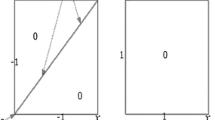Abstract
We provide approximation results for Nash equilibria in possibly discontinuous games when payoffs and strategy sets are perturbed. We then prove existence results for a new “finitistic” infinite-game generalization of Selten’s (Int J Game Theory 4: 25–55, 1975) notion of perfection and study some of its properties. The existence results, which rely on the approximation theorems, relate existing notions of perfection to the new specification.
Similar content being viewed by others
Notes
Some care is required here. For example, the closedness conclusion of Corollary 1 would not hold if we presented our definitions in terms of sequences rather than nets.
We thank an anonymous referee for suggesting this argument.
This leads Simon and Stinchcombe to strengthen the notion of lof perfection to anchored perfection. However, Simon and Stinchcombe (1995) claim that even anchored perfect profiles may fail limit admissibility in continuous games.
Given \(k\), let \(\{a_{1},\ldots ,a_{\ell }\}\) be the finite support of \(\lambda _{i}^{k}\). Since \(Y_{i}^{m}\rightarrow X_{i}\), for each \(l\in \{1,\ldots ,\ell \} \) one can choose a sequence \((\alpha _{l}^{m})\) such that \(\alpha _{l}^{m}\in Y_{i}^{m}\) for each \(m\) and \(\alpha _{l}^{m}\xrightarrow [m \rightarrow \infty ]{}a_{l}\). For each \(m\), define \(\widehat{\nu }_{i}^{m}\) in \(\Delta (X_{i})\) by
$$\begin{aligned} \widehat{\nu }_{i}^{m}(\{\alpha _{l}^{m}\}):=\lambda _{i}^{k}(\{a_{l}\}),\quad \text{ for} \text{ each} l\in \{1,\ldots ,\ell \} \end{aligned}$$and note that \(\text{ supp}(\widehat{\nu }_{i}^{m})=\{\alpha _{1}^{m},..,\alpha _{\ell }^{m}\}\subseteq Y_{i}^{m}\) for each \(m\). Let \(\widetilde{\nu } _{i}^{m}\in \Delta (X_{i})\) be defined by \(\widetilde{\nu } _{i}^{m}(\{y_{i}^{m}\}):=\frac{1}{\#Y_{i}^{m}}\) for each \(y_{i}^{m}\in Y_{i}^{m}\), where \(\#Y_{i}^{m}\) denotes the cardinality of the finite set \( Y_{i}^{m}\). Define, for each \(m\),
$$\begin{aligned} \nu _{i}^{m}:=\left( 1-\frac{1}{m}\right) \widehat{\nu }_{i}^{m}+ \frac{1}{m}\widetilde{\nu }_{i}^{m} \end{aligned}$$and note that \(\text{ supp}(\nu _{i}^{m})=Y_{i}^{m}\) for each \(m\). To see that \(\nu _{i}^{m}\rightarrow \lambda _{i}^{k}\), let \(O_{i}\) be an open set in \(X_{i}\) and define \(I:=\{l:a_{l}\in O_{i}\}.\) Then there exists an \( \widehat{m}\) such that, \(\alpha _{l}^{m}\in O_{i}\) for each \(m>\widehat{m}\) and each \(l\in I.\) Therefore, \(m>\widehat{m}\) implies that
$$\begin{aligned} \lambda _{i}^{k}(O_{i}\cap \{a_{1},\ldots ,a_{\ell }\})=\sum _{l\in I}\lambda _{i}^{k}(\{a_{l}\})=\sum _{l\in I}\widehat{\nu }_{i}^{m}(\{\alpha _{l}^{m}\})\le \widehat{\nu }_{i}^{m}(O_{i}\cap \{\alpha _{1}^{m},\ldots ,\alpha _{\ell }^{m}\}), \end{aligned}$$so for \(m>\widehat{m},\) we have
$$\begin{aligned} \nu _{i}^{m}(O_{i})&= \left( 1-\frac{1}{m}\right) \widehat{\nu } _{i}^{m}(O_{i})+\frac{1}{m}\widetilde{\nu }_{i}^{m}(O_{i}) \\&= \widehat{\nu }_{i}^{m}(O_{i})+\frac{1}{m}\left( \widetilde{\nu } _{i}^{m}(O_{i})-\widehat{\nu }_{i}^{m}(O_{i})\right) \\&\ge \widehat{\nu }_{i}^{m}(O_{i})-\frac{1}{m} \\&= \widehat{\nu }_{i}^{m}(O_{i}\cap \{\alpha _{1}^{m},\ldots ,\alpha _{\ell }^{m}\})-\frac{1}{m} \\&\ge \lambda _{i}^{k}(O_{i}\cap \{a_{1},\ldots ,a_{\ell }\})-\frac{1 }{m} \\&= \lambda _{i}^{k}(O_{i})-\frac{1}{m}, \end{aligned}$$from which it follows that \(\underline{\lim }\,\nu _{i}^{m}(O_{i})\ge \lambda _{i}^{k}(O_{i})\).
References
Al-Najjar, N.: Strategically stable equilibria in games with infinitely many pure strategies. Math. Soc. Sci. 29, 151–164 (1995)
Bagh, A.: Variational convergence: approximation and existence of equilibria in discontinuous games. J. Econ. Theory 145, 1244–1268 (2010)
Bagh, A., Jofre, A.: Weak reciprocal upper semi-continuity and better reply secure games. Econometrica 74, 1715–1721 (2006)
Bajoori, E., Flesch, J., Vermeulen, D.: Perfect equilibrium in games with compact action spaces. Maastricht University RM/11/029 (2011)
Barelli, P., Soza, I.: On the existence of Nash equilibria in discontinuous and qualitative games, mimeo (2010)
Beer, G.A.: Topologies on Closed and Closed Convex Sets. Kluwer Academic Publishers, Dordrecht (1993)
Billingsley, P.: Convergence of Probability Measures. Wiley, New York (1968)
Carbonell-Nicolau, O.: The existence of perfect equilibrium in discontinuous games. Games 2, 235–256 (2011a)
Carbonell-Nicolau, O.: Perfect and limit admissible perfect equilibria in discontinuous games. J. Math. Econ. 47, 531–540 (2011b)
Carbonell-Nicolau, O.: On the existence of pure-strategy perfect equilibrium in discontinuous games. Games Econ. Behav. 71, 23–48 (2011c)
Carbonell-Nicolau, O., McLean, R.P.: Approximation results for discontinuous games with an application to equilibrium refinement, Mimeo (2012)
Carmona, G.: Understanding some recent existence results for discontinuous games. Econ. Theory 48, 31–45 (2011a)
Carmona, G.: Symposium on: Existence of Nash equilibria in discontinuous games. Econ. Theory 48, 1–4 (2011b)
de Castro, L.I.: Equilibrium existence and approximation of regular discontinuous games. Econ. Theory 48, 67–85 (2011)
Dasgupta, P., Maskin, E.: The existence of equilibrium in discontinuous economic games, I: Theory. Rev. Econ. Stud. 53, 1–26 (1986)
Gürkan, G., Pang, J.S.: Approximations of Nash equilibria. Math. Program. B 117, 223–253 (2009)
Lebrun, B.: Existence of an equilibrium in first price auctions. Econ. Theory 7, 421–443 (1996)
Lucchetti, R., Patrone, F.: Closure and upper semicontinuity results in mathematical programming, Nash and economic equilibria. Optimization 17, 619–628 (1986)
McLennan, A., Monteiro, P.K., Tourky, R.: Games with discontinuous payoffs: a strengthening of Reny’s existence theorem. Econometrica 79, 1643–1664 (2011)
Prokopovych, P.: On equilibrium existence in payoff secure games. Econ. Theory 48, 5–16 (2011)
Reny, P.J.: On the existence of pure and mixed strategy Nash equilibria in discontinuous games. Econometrica 67, 1029–1056 (1999)
Reny, P.J.: Strategic approximations of discontinuous games. Econ. Theory 48, 17–29 (2011)
Selten, R.: Reexamination of the perfectness concept for equilibrium points in extensive games. Int. J. Game Theory 4, 25–55 (1975)
Simon, L.K.: Games with discontinuous payoffs. Rev. Econ. Stud. 54, 569–597 (1987)
Simon, L.K., Stinchcombe, M.B.: Equilibrium refinement for infinite normal-form games. Econometrica 63, 1421–1443 (1995)
Yu, J.: Essential equilibria of \(n\)-person noncooperative games. J. Math. Econ. 31, 361–372 (1999)
Author information
Authors and Affiliations
Corresponding author
Additional information
We thank two anonymous referees for helpful comments.
Rights and permissions
About this article
Cite this article
Carbonell-Nicolau, O., McLean, R.P. Approximation results for discontinuous games with an application to equilibrium refinement. Econ Theory 54, 1–26 (2013). https://doi.org/10.1007/s00199-012-0727-x
Received:
Accepted:
Published:
Issue Date:
DOI: https://doi.org/10.1007/s00199-012-0727-x
Keywords
- Discontinuous game
- Nash equilibrium correspondence
- Equilibrium refinement
- Finite approximation
- Trembling-hand perfect equilibrium
- Limit-of-finite perfect equilibrium



